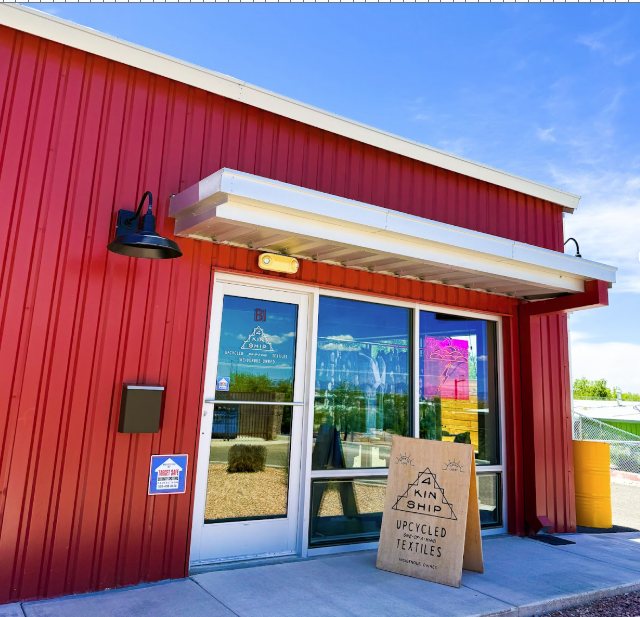
- Details
- By Kaili Berg
4KINSHIP, the Diné and women-owned sustainable fashion brand, is opening its first flagship store this Friday, May 23, in Santa Fe’s Siler Rufina Art District.
The 2,440-square-foot space is more than just retail, it’s a studio, community hub, and home base for 4KINSHIP’s nonprofit, Indigenous Futures 4EVER.
“This is the dream space I’ve been envisioning for years,” founder Amy Denet Deal told Native News Online. “It’s the biggest space we’ve ever had, and it lets us grow, not just as a brand, but as a community.”
The brand, known for upcycled fashion and Indigenous-centered design, started nearly 10 years ago when Deal left a career in fast fashion to create something more intentional.
“I was making toxic waste for my daughter’s future,” Denet Deal said. “I had to do better.”
What began as a side hustle with her daughter grew into a nationally recognized label rooted in sustainability, cultural connection, and reciprocity.
Friday’s opening celebration (6–9 PM) features a performance by Dark Winds actor Hataaliinez El Wheeler, DJ sets from Kuwani, and the launch of a new capsule collection dyed by hand in traditional medicine colors.
Guests can also expect skateboard ramps, conscious cocktails (non-alcoholic), and a chance to literally skate through the store.
On Saturday, 4KINSHIP will debut its first Next Gen Market, a free pop-up space across from the Santa Fe Farmers Market for young Indigenous creatives and entrepreneurs.
“A lot of local markets are expensive and restrictive,” said Denet Deal. “We want to make space for all kinds of Native makers, from fine art to screen-printed tees.”
With plans to eventually take the brand global, Deal says Santa Fe is just the beginning.
“Our work is about building futures, for our youth, our artists, and our communities,” Denet Deal said.
More Stories Like This
A Native American Heritage Month Playlist You Can Listen to All Year Long11 Native Actors You Should Know
Five Native American Films You Should Watch This Thanksgiving Weekend
Heavy metal is healing teens on the Blackfeet Nation
Over 150 Tribal Museums Participate in Fourth Annual Celebration of Native Life
Help us tell the stories that could save Native languages and food traditions
At a critical moment for Indian Country, Native News Online is embarking on our most ambitious reporting project yet: "Cultivating Culture," a three-year investigation into two forces shaping Native community survival—food sovereignty and language revitalization.
The devastating impact of COVID-19 accelerated the loss of Native elders and with them, irreplaceable cultural knowledge. Yet across tribal communities, innovative leaders are fighting back, reclaiming traditional food systems and breathing new life into Native languages. These aren't just cultural preservation efforts—they're powerful pathways to community health, healing, and resilience.
Our dedicated reporting team will spend three years documenting these stories through on-the-ground reporting in 18 tribal communities, producing over 200 in-depth stories, 18 podcast episodes, and multimedia content that amplifies Indigenous voices. We'll show policymakers, funders, and allies how cultural restoration directly impacts physical and mental wellness while celebrating successful models of sovereignty and self-determination.
This isn't corporate media parachuting into Indian Country for a quick story. This is sustained, relationship-based journalism by Native reporters who understand these communities. It's "Warrior Journalism"—fearless reporting that serves the 5.5 million readers who depend on us for news that mainstream media often ignores.
We need your help right now. While we've secured partial funding, we're still $450,000 short of our three-year budget. Our immediate goal is $25,000 this month to keep this critical work moving forward—funding reporter salaries, travel to remote communities, photography, and the deep reporting these stories deserve.
Every dollar directly supports Indigenous journalists telling Indigenous stories. Whether it's $5 or $50, your contribution ensures these vital narratives of resilience, innovation, and hope don't disappear into silence.
 The stakes couldn't be higher. Native languages are being lost at an alarming rate. Food insecurity plagues many tribal communities. But solutions are emerging, and these stories need to be told.
The stakes couldn't be higher. Native languages are being lost at an alarming rate. Food insecurity plagues many tribal communities. But solutions are emerging, and these stories need to be told.
Support independent Native journalism. Fund the stories that matter.
Levi Rickert (Potawatomi), Editor & Publisher

